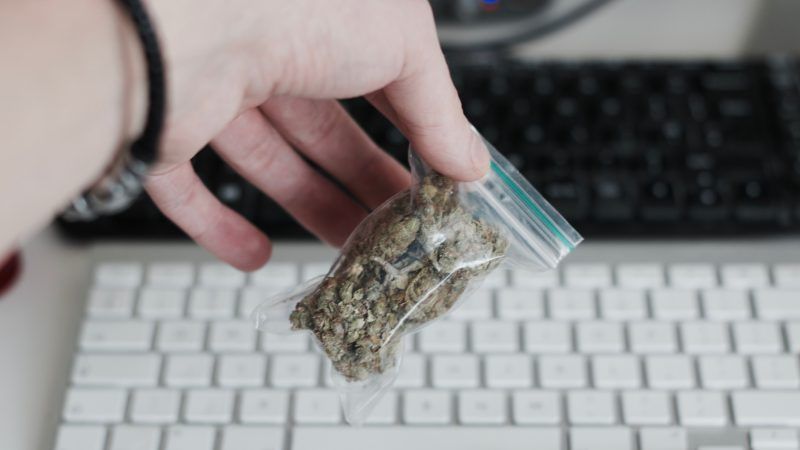I Got Stoned and Did My Taxes
Being comfortably high makes the burden of taxes a bit less awful.

This is my first year married filing jointly, and also my first year being stoned while I do my taxes.
The first hurdle was trying to remember my TurboTax password. Well, the first hurdle was building up the motivation to do my taxes. I smoked a massive joint with my husband and browsed flights to Budapest and Dubrovnik before realizing that I could not procrastinate anymore and also could not fly to Eastern Europe to avoid my tax burden.
High people can be quite functional. I have a decent sense of my own limits. I was high for the vast majority of college: an acolyte of the wake-and-bake school of thought, trotting to class each day under the influence of coffee and a spliff. Prattling professors and try-hard college students couldn't get to me if I was stoned, so I would sit in the back of the class and read the news each morning in a slight stupor—my bookwormish ritual. Weed has always gently mellowed my naturally Type A, ultra-organized personality. If it can dull the pain of higher education, presumably it can dull the pain of taxes too.
At the beginning of TurboTax's tour, they ask you to answer a few questions about ways your financial circumstance has changed over the past year. I had switched jobs and—more important to the IRS—had gotten married. "Most couples who file together save money on their taxes together! We'll gather info for both of you, and help get your first refund as a couple." TurboTax chirped, accompanied by a heteronormative graphic of a diamond ring intertwined with a chunky wedding band.
I uploaded my W2s and started tediously entering freelancing 1099s. I connected my Wealthfront investment account to the TurboTax platform. I attempted to demystify what a 1099-DIV is, and to figure out how to declare our various investments. No real roadblocks thus far, but my mind kept wandering.
As I got to the charitable giving part, a thought came to me: Maybe one good side effect of taxes is that they force people to confront whether charitable giving and (for the religious among us) tithing really matter to them. Oh no, am I becoming one of those people, the ones who let government incentives dictate their actions? I think so, just a little bit.
Last year we gave one-time donations to various causes, but nothing enormous. While filing taxes this month, we realized the error of our ways, and also that a write-off sounds nice. The day after filing, we set up monthly donations to our church (non-denominational, but Baptist-tinged) and to immigrant and refugee respite centers in the Rio Grande Valley. The government nudge wasn't the single deciding factor—this is something we'd wanted to do for a long time—but it was the catalyst that brought it front of mind. (Tokes.) Thanks for the reminder, taxes!
As the legal theft droned on (asking about property taxes and mortgages), my stoned mind couldn't help but marvel at the glorious invention of TurboTax. Our entrepreneurial overlords had created software that makes everyone's yearly government takings way easier to calculate and complete. Now they have a near-monopoly on digital tax-filing services. Also, what a brilliant business concept: a platform that appeals and caters to almost everyone. Shark Tank's wise sage Kevin O'Leary has a saying about how entrepreneurs should focus on areas where there are built-in markets (i.e., weddings and funerals). The TurboTax inventors went even further! All hail the free market! I delighted in the built-in audit risk assessment for freelancers far more than any sober human being would. I smoked another joint on the porch and sipped some coffee.
Things took a turn for the worse when I got to the page that asked "Do you want to donate $3 to the presidential campaign fund? This will not reduce your refund or increase your tax due." I clicked on the description, rightly fearing the worst. TurboTax explained that this opt-in funding of elections could "reduce candidates' dependence on large contributions and, hopefully, to put everyone on an equal financial footing (so they'd have more time to discuss the issues)."
It was at this point that I realized I wasn't sufficiently stoned anymore. As if candidates would focus on the substance—and as if that substance would matter to the many hobbits and hooligans swarming around the ballot boxes like flies. As TurboTax auto-checked for more credits and deductions, my brain descended into campaign finance reform, and I made some cannabutter tea (Thai red tea with milk, a hefty chunk of homemade cannabutter, and some sweetener), which produces a long-lasting but mild high.
By the time we were done, we owed the government a lot of money and the covered porch smelled like a hotboxed dorm room.
Pot isn't a cure-all. It didn't cure the pain of owing the government roughly $2,000, or the frustration of wondering whether we were entering all our stock holdings correctly. But it did make rote data entry just a little more fun. Marijuana apparently isn't too dangerous to inhibit me from filing my tax returns. I even managed to figure out the 1099-DIVs.
Weed is one substance in our arsenal that makes the mundane necessities of life a bit more manageable, a bit more whimsical, and a bit less dreaded. If they're going to make us surrender hard-earned wads of cash, we at least ought to be able to chief a blunt while we do it.


Show Comments (35)